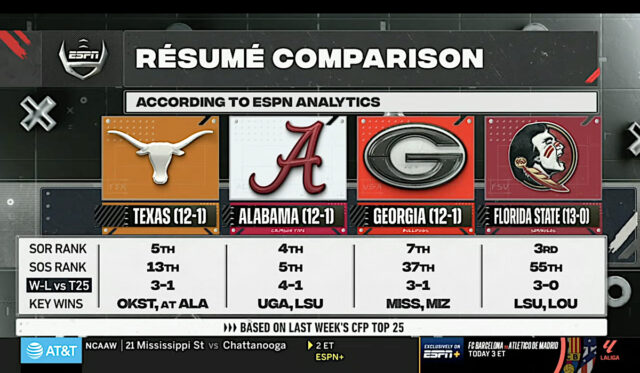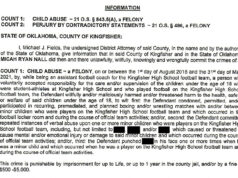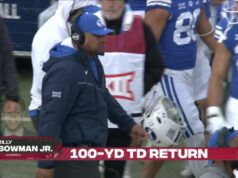

Math is hard.
You don’t have to tell me. I made a B and a D in my mathematics classes in college, the only two I was required to take as a journalism major. The B came thanks to my girlfriend at the time, who tutored me to the point of almost doing the work herself. The D, again, came thanks to her, as she dumped me right before the semester began, which left me to my own computational incompetence.
I say all this because the level of FUBAR the College Football Playoff has achieved over the past decade can only be explained by mathematical malpractice.
It doesn’t take a genius to figure out there are FIVE power conferences in the, ahem, power-five group of conferences. Meanwhile, there are only FOUR teams in the, ahem, four-team College Football Playoff.
For the past nine years, the college football postseason has managed to fit — to a debatable amount of success — a square peg in a round hole despite the five-conference, four-seed conundrum. This weekend, the square-peg-and-round-hole problem transformed into more of a two-ton-dodecahedron-being-forced-into-the-backseat-of-my-dad’s-old-1970s-Chevy Vega issue.
There’s literally no airtight and defendable rhyme nor reason for making ANY choice of four playoff teams this season, and the committee’s decision to include Alabama over Florida State and Georgia shows what an imperfect scenario the selection committee faced this year, like so many other years.
I must plainly make clear that my rant in this intro of these Hangover Highlights isn’t about WHOM the committee ended up picking. (This was published moments after the decision was announced, and I actually wrote it several hours beforehand.) It’s about the ridiculousness of the how and why this decision is being made in the first place.
2023 CFP teams
1) Michigan
2) Washington
3) Texas
4) Alabama
Ten years ago, college football possessed an imperfect postseason process. The Bowl Championship System had been in place for more than a decade and had been tinkered, shaken and stirred until the powers that be finally ended it after the 2013 season. We all wanted more than two teams to have a chance at the championship.
What the college football world didn’t realize at the time is how it was selling its soul to an even WORSE system: the four-team playoff. On the surface, it seemed great to include additional teams in the hunt for the national championship. But what it actually did was render even more moot those conferences and teams that eventually found themselves out of the running.
So many times, one conference or another had its season left on the scrap heap because member schools had essentially been eliminated from the playoff race. In those years, in-season conference race showdowns within those particular leagues were deemed unimportant in the grand scheme of things. While the other conference races essentially evolved into a tournament for one of the playoff berths, there always seemed to be one league completely left out of the spotlight.
When multiple conferences are left out, such as in the old BCS, well, misery truly loved company. When the University of Oklahoma, for example, won its conference title in 2002, but wasn’t one of the two-team BCS title selections, it at least joined the Pac-12, Southeastern Conference and Atlantic Coast Conference champions in major bowl games, many against each other. Those games weren’t for the national championship, but because so many titleists were in the same boat, nobody felt singularly aggrieved, and those non-championship bowl games felt important with many top-notch teams participating.
Fast-forward to the current four-team system, and the one power conference winner left in the cold essentially feels picked-upon, as does its conference. They’re forced to play the runner-up from another major conference, or a mid-major champion, in what is for all intents and purposes a second-tier bowl game outside of the playoff games.
Hence, we see the dozens of opt-outs by players and a lack of interest in these non-CFP games, which ends up cascading to all the bowl games even lower in the pecking order.
Next season will unveil the latest “fix” to college football’s execrable history of a postseason, with the brains that be leapfrogging the logical eight-team playoff for a 12-team slate that features a bye week for the top four seeds and an additional two weeks of games that will will dilute the product on the field further with added injuries and exhaustion. (Just ask the NFL.)
Despite those certain drawbacks to the bigger bracket, the increased importance for so many would-be-forgotten conferences’ regular season games should offset any perceived lessening of do-or-die desperation in the traditional monster games. Fans and followers will always watch, live and die during Michigan vs. Ohio State — and other major big-game rivalries — regardless of bigger national stakes. Yet, with the 12-team playoff, suddenly a game like Boise State vs. UNLV becomes uber-important, as the winner could break into the national championship tournament.
This year, however, we remain stuck with an imperfect tournament of just four, and the fans of Florida State — and even Georgia — have reason to be pissed off about the decision of the CFP selection committee, whose mantra has always been, “Someone is getting screwed.”
Oh well, onto the playoff-infused Hangover Highlights for championship weekend:
- Last week, I mentioned that Texas appeared to be a terrible matchup for Oklahoma State in the Big 12 championship, and my analysis proved true in Saturday’s 49-21 lopsided result. It wasn’t so much the Longhorns’ ability to corral OSU all-world tailback Ollie Gordon, though, as it was Oklahoma State’s complete inability to cage any facet of the Texas offense in the first half. Texas moved through the OSU defense like laxative through troubled guts, setting several offensive records in the process and building a big lead.
- Playing from behind negated the impact of OSU’s power running game, which Gordon the Cowboys had leaned upon most of the season. That left the offense in the hands of quarterback Alan Bowman, who unsurprisingly proved to be neither terrible nor terrific and finished with a completely middling outing that was inadequate against Texas’ offensive outburst.
- The convincing loss can’t help but take some shine off an undeniably weird season for the Cowboys. The preamble for Saturday’s title-game disaster included a blowout loss to South Alabama, followed by home wins against ranked Kansas State, Kansas and Oklahoma, which led into an evisceration at UCF and sputtering victories over Houston and BYU. Nobody knew which OSU team would show up from week to week this season, although a perceived perseverance over the team’s problems landed Mike Gundy Big 12 mullet coach of the year honors.
- Texas, meanwhile, looked as dominant as any squad in the country Saturday. The Longhorns, however, were also playing the lowest-ranked school of all conference championship game participants among power-five conferences, so it’s hard to decide what to make of them in light of how other conference champions fared.
- Meanwhile, in Charlotte, North Carolina, it seemed like much-maligned OU backup quarterback Davis Beville had multiplied like a Tribble from Star Trek and manifested his selves as the starting QBs for both Florida State and Louisville during a 16-6 FSU win. After one quarter, FSU freshman quarterback Brock Glenn and Louisville senior quarterback Jack Plummer had combined for 17 passing yards. By halftime, the total had reached just 73 passing yards.
- At one point, with the game tied 3-3 late in the third quarter, discussion within the watch party at my house turned to whether an offensively-challenged tie game could still be decided by “penetrations” — the long-discarded practice of high football in Oklahoma for settling ties. If a game finished knotted, instead of overtime, whichever team crossed the opponent’s 20-yard line the most times during the game was declared the winner. Hence, it was won by “penetrations.”
- Penetrations or not, at least the Seminoles and Glenn had an excuse for such a putrid offensive performance: The freshman had been the third-string quarterback all season and had only been thrust into his first start of his career after injuries derailed FSU’s other two quarterbacks last month. Louisville passer Jack Plummer had no such reason to fail, as he was simply inept in the face of the stout Florida State defense.
- Florida State defensive end Jared Verse is purely the best defensive linemen I’ve seen play in college football since Oregon’s Kayvon Thibodeaux in 2021.
- Speaking of Oregon, the Ducks and the Washington Huskies put on a damn enjoyable Pac 12 championship game Friday in what turned out to be a 34-31 Washington win. It appeared Washington was going to run away early, with a 20-3 first-half lead, but Oregon stormed back in the middle part of the game and eventually took a fourth-quarter lead. In the end, the Washington offense — as it had most of the season — proved to be too much, and the Huskies prevailed.
- The Iowa vs. Michigan game for the Big 10 championship unwound as pretty much everyone expected: Iowa’s defense gave a spirited effort, but its offense proved to be too much like the Kodan Armada of attacking forces to take advantage.
- Finally, in the biggest game and outcome of the weekend, Alabama did what it always does in the SEC Championship game: beat Georgia. The Crimson Tide pushed its record to a perfect 3-0 against the Bulldogs in conference title tilts with a 27-24 win.
- An early Georgia lead didn’t seem to bother Alabama, as the Crimson Tide simply outplayed the Bulldogs the rest of the way. Bama quarterback Jalen Milroe is probably more suited as a single-wing signal-caller than a modern spread offense trigger man, but Tide head coach Nick Saban has wondrously molded his offense around Milroe’s strengths and has negated his weaknesses.
- For Georgia, Saturday marked its first loss since the 2021 SEC title game against, yes, the same Alabama Crimson Tide, 29 games ago.
- Rest easy, 47-game winning streak.




















